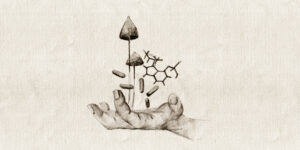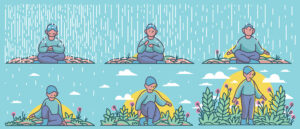“Are you working in psychedelic research? And can I participate in it?” Phrases I hear repeatedly almost every time I mention that my professional subject is psychedelics. I always wonder if people are aware of what it really means to become a research subject.
Conditioned by Depression
Imagine being diagnosed with depression—otherwise you wouldn’t meet the basic criteria for the ongoing psychedelic research called PSIKET001 that has been conducted at the National Institute of Mental Health, Czech Republic. This research is a clinical evaluation comparing the effect of three substances: first psilocybin – an alkaloid that is contained in its natural form in fungi of the genus Psilocybe. Classified as a classic psychedelic, but also as a drug without medical use, these mushrooms and their active ingredient, psilocybin, belong to the list of prohibited substances. The second psychedelic under investigation is ketamine. It is an anesthetic and is therefore classified as a drug with useful medical applications, however, it does provide a psychedelic effect. As there is research demonstrating its positive potential in rapidly reversing depression, it is possible to use it for this diagnosis as well. The last substance is midazolam, a benzodiazepine, which is a sedative. This study is double-blind, meaning that no one knows (neither the patient, nor the doctor, nor the therapist) what substance the patient will receive on D day.
Let’s continue step by step. You are one of the 700,000 people who have sought professional help because your experience of existence has become unbearable. Depression and anxiety rule your life. Truly challenging mornings where you can barely make it to your job alternate with times when you actually don’t make it there because just getting up takes so much energy and you don’t have any. You feel deep sadness, emptiness, and hopelessness. This is unfortunately not a made up or exaggerated scenario, this is what most patients really deal with!
When the situation becomes really critical, you go and see a psychiatrist and say: “Give me something to relieve the pain. I don’t want to deal with it.” My colleagues from the psychiatry department often mention that it is not uncommon for people to come seeking relief from their afflictions in the form of drugs, but with no interest in opening the dusty chambers of their souls and peering into the hidden recesses of their psyches. A psychiatrist will not often help them with this anyway – in the whole process his role is quite different. Psychiatrists offer treatment options in the form of drugs or other treatment approaches, psychotherapy is usually not within their scope, and certainly not within the time options reimbursed by insurance companies. That’s why there are psychologists and psychotherapists.
Those who would actually like to dive deep to reveal the roots of their suffering are in for quite a difficult search for a soulmate therapist. Once one is lucky to find a therapist who clicks, the long-term work begins, more likely a bit of a marathon that passes through the chapters of one’s life step by step. Psychotherapeutic work only bears fruit in the long term, therefore if you are currently unwell, it may not seem very valid. The fruit on the tree doesn’t grow overnight.
Stepping out of the comfort zone
So let’s say we have a patient, we may call her Toni (to maintain sufficient anonymity, this woman is an extraction and intersection of several patients). Toni searched for information about the PSIKET001 study, read in depth the details on the Psychedelic Research Foundation website (https://psyres.eu/en), and found that she met the criteria to participate in. On the PSIKET001 research website (https://psiket.cz/) she came across other requirements, such as the age of at least eighteen years and no history of psychotic illness in the close family, etc. There is also an entry questionnaire which the interested party fills out and soon will receive feedback on whether or not they should apply for the treatment.
Toni was admitted for the treatment and signed informed consent. This is followed by check-up visits associated with the gradual discontinuation of the antidepressants she is taking, despite not feeling any long-term improvement. Alongside visits to psychiatric care, she has to undergo two preparatory sessions with me and a fellow therapist – together we will facilitate her (ideally) psychedelic experience. After this experience, she will spend two weeks in one of the wards at the National Institute of Mental Health, to allow space for a proper integration of the experience and to have a doctor on hand in case of any complications. Because this is for use in a clinical research context, Toni is also required to undergo three MRI neuroimaging tests – one prior to the administration of the research medication and two afterwards. She will also undergo EEG brain testing.
An aspect of disappointment
And so, Toni prepares herself. She has already tapered off her medications and is experiencing the typical worsening of symptoms. Anxiety is more intense and frequent. A sad emptiness walks alongside a slyly laughing despair, but for once Toni ignores them, believing that the treatment will help her. She had already tried everything possible, and it took her a while to truly dare to step into the unknown. Physically, she doesn’t feel very well, but confidence in the experimental treatment prevails. Giving up is not an option. “Are you aware of the possibility that you might receive midazolam, a substance that, compared to the intensity of psychedelics, ranks as a placebo? How do you think you would feel then?” we ask Toni at the second preparatory session, the day before the administration of the study medication. “I would be disappointed,” she replies. It’s no wonder. It was preceded by months of determination and subsequent preparation. Toni even travels to Prague for all the examinations from her village more than one hundred kilometers away. She is determined, hopeful, and we hope with her. It may be a therapeutic paradox that while aware of the potential benefit of psychedelics, some patients receive a placebo, although we have no doubt that the psychedelic experience could be the catharsis that she so desperately needs.
On the other hand, research entails an experimental environment, which has its own principles that cannot be ignored. In the case of PSIKET001, twenty patients will receive ketamine, twenty psilocybin, and twenty midazolam. If a patient receives a substance that is not psychedelic (in this case, midazolam), they may feel that they have contributed to the research, that they have become part of something very important, but disappointment will likely prevail.
D Day
We are sitting in a room that has been created to provide a safe space for psychedelic experiences. Two therapy chairs embrace a comfortable bed, next to which can be found audio equipment, blindfolds, and high-quality headphones. Toni is holding in her hands a box with five capsules filled with an unknown substance brought by the doctor a moment ago. None of us (not even the doctors) knows exactly what the capsules contain. All three of us are holding our breath – we wish for her to have a good trip, a healing experience!
Toni, who mentions that her stomach is rumbling because she hasn’t eaten anything since morning, puts on her headphones, eye shades, and gets comfortable under the covers. We’re getting started. After about an hour, during which there was also a time when Toni started to breathe so calmly that we couldn’t tell if she fell asleep, she sits up and says she doesn’t feel anything, but she enjoys the music, and a time of deep rest. She takes a sip of water and lies down again. She seems to have shed a few tears, which she wipes away from under the mask. Later, she shares that to actually stop and do nothing brought her back to memories and moments she hadn’t touched in a long time.
Another two hours pass and Toni feels nothing but a mild calmness. It seems that she’d received benzodiazepine and waiting for the psychedelic experience, or rather, the tangible change of consciousness, would have been like waiting for Godot.
After another hour, she is already loading up on fruit and finally gets her lunch a little ahead of schedule. She feels good, rested, sad, but also mentions gratitude. Grateful for being able to go through it. After the appropriate time has passed, she fills out the necessary questionnaires, and shares her delight of having to spend two weeks at NIMH, which she intends to devote just to herself. There’s a sense of disappointment in the air, hers and ours as well; we really wished for her, just like for every patient who gets this far – the real experience. But we try not to show it. Research is research, and so we emphasize her contribution to science.
After time
To our great surprise, after just one week we met a smiling patient. Seven days after the experience that seemed to have no psychedelic effect, neither depression nor anxiety returned. An interesting phenomenon, especially since no one knows what substance she actually received. Could it have been psilocybin, without any effect on Toni’s consciousness?
What is not so positive is that the design of the study does not allow the patient to try any other approach for the next three months. If she does, she would violate the rules of the study, nullifying her contribution to science. It is a high price to pay for the fact that this form of treatment is illegal and the only way to participate in it is through such research. We can only hope the future research will not be conducted under such strict conditions, and that this treatment will be made accessible to patients who need it.
And so, during the final session we reflect on the current situation, the experience itself, and the possibilities that the next three months offer. Together with Toni we hope that the improvement of her mental state will persist. Unfortunately, as a therapist, we most likely will never know how the patient continued to develop.
In conclusion, I would like to mention that according to all available information and movements in the global field of psychedelic studies, we stand on the threshold of new treatments with great potential for all those determined to recognize the roots of their problems and find paths to healing. The current state of psychedelic research is indeed a demanding process, but certainly everyone involved – researchers, therapists and courageous patients – all deserve a big round of applause, as well as gratitude and support, because it is thanks to them that other patients have the hope of expanding the portfolio of available treatment approaches.
This article was published in the November issue of Psychology Today (12/2023).



